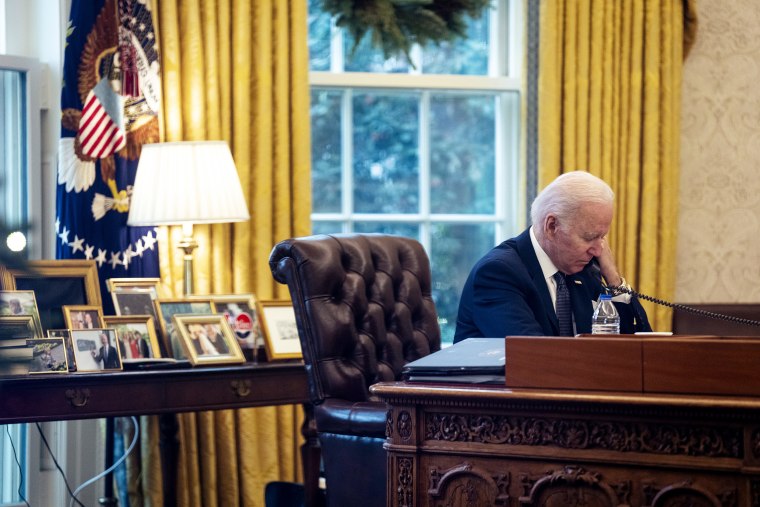It’s not unusual for American presidents to hold conversations with historians, who can help provide far broader contexts outside of day-to-day developments in the White House. Barack Obama, for example, hosted several meetings with leading scholars, who came to realize the Democrat wanted to apply “the lessons of past presidential triumphs and failures to his own urgent project of setting the country on a new path.”
Except for Donald Trump, every recent president, starting with Ronald Reagan, has participated in these kinds of sessions with historians.
With this in mind, it didn’t come as too big of a surprise to learn that our incumbent president recently hosted a related White House conversation. The Washington Post reported:
President Biden paused last week, during one of the busiest stretches of his presidency, for a nearly two-hour private history lesson from a group of academics who raised alarms about the dire condition of democracy at home and abroad. The conversation during a ferocious lightning storm on Aug. 4 unfolded as a sort of Socratic dialogue between the commander in chief and a select group of scholars, who painted the current moment as among the most perilous in modern history for democratic governance, according to multiple people familiar with the discussions who spoke on the condition of anonymity to describe a private meeting.
According to the Post’s account, the conversation was quite serious, with historians comparing contemporary conditions to the years leading up to the 1860 election and the late 1930s, when there was growing American support for European fascism.
Biden reportedly took notes during the meeting, and explored anti-democratic trends here and abroad.
At face value, it’s easy to imagine any president benefiting from conversations like these: Chief executives have to spend so much time looking at trees, there’s value in having experts help them reflect on forests.
But reading about Biden’s meeting, I was reminded that his immediate predecessor, while eschewing such gatherings during his term, also spoke to a group of presidential historians around this time last year. Julian Zelizer, a historian at Princeton, recently wrote about the discussion for The Atlantic.
As an academic historian, I never expected to find myself in a videoconference with Donald Trump. But one afternoon last summer—a day after C-SPAN released a poll of historians who ranked him just above Franklin Pierce, Andrew Johnson, and James Buchanan, our country’s worst chief executives—he popped up in a Zoom box and told me and some of my colleagues about the 45th presidency from his point of view. He spoke calmly. “We’ve had some great people; we’ve had some people that weren’t so great. That’s understandable,” he told us. “That’s true with, I guess, every administration. But overall, we had tremendous, tremendous success.”
Evidently, the Republican learned about a scholarly book, “The Presidency of Donald J. Trump: A First Historical Assessment,” and he was eager to speak to the historians who contributed to the project.
But unlike those who wanted to learn from experts, Trump was eager to try to persuade the scholars, talking about how impressed he was with his awesomeness. He reflected on accomplishments that only existed in his imagination — the Republican insisted, for example, that he made European leaders pay NATO dues that still aren’t real — and marveled at all the many people who told him how great he was.
The former president also, naturally, pretended that he’d secretly won the election that he’d lost.
Zelizer added, “During our hour together, Trump didn’t have many questions for us.”
When thinking about the ways the Republican differs from other presidents, including his successor, we can add this to the exceedingly long list.

